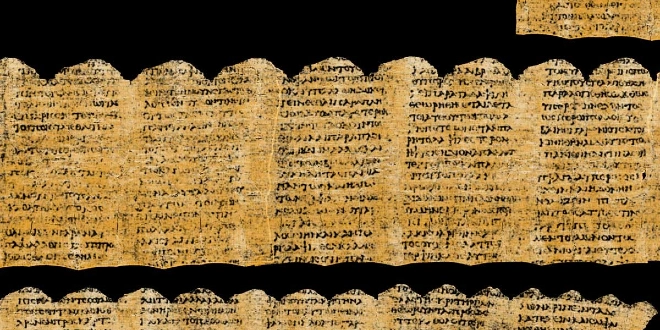In a remarkable achievement, three researchers successfully read a 2,000-year-old scroll buried during Mount Vesuvius’ eruption that devastated Pompeii, using artificial intelligence (AI). For this groundbreaking work, they were awarded a substantial cash prize of $700,000 on Monday, February 5.
The scroll is part of the Herculaneum papyri collection, which contains about 800 Greek scrolls carbonized in the 79 CE eruption. These scrolls, resembling logs of hardened ash, are stored at the National Library of Naples and the Institut de France in Paris. Efforts to unroll these scrolls have previously led to significant damage and crumbling.
Unable to physically open the scrolls, the “Vesuvius Challenge” initiative conducted high-resolution CT scans of four scrolls and announced multiple cash rewards totaling one million dollars to expedite research on these ancient texts.
Among the winners were Luke Farritor, a student and SpaceX intern from Nebraska, Youssef Nader, a PhD student in Berlin, and Julian Schilliger, a Swiss robotics student. They utilized AI to differentiate between ink and papyrus and employed pattern recognition to interpret the faint, nearly illegible Greek letters.
Robert Fowler, chair of the Herculaneum Society and a classicist, expressed to Bloomberg Businessweek magazine that these texts could potentially transform our understanding of significant periods in ancient history.
The researchers’ task involved deciphering four passages, each at least 140 characters long, with 85% of the characters being recoverable. Last year, Farritor managed to decode the Greek word for “purple” from one of the scrolls.
The collaborative effort of these researchers has led to the decryption of approximately five percent of one of the scrolls. According to contest organizer Nat Friedman, the scroll’s author is likely the Epicurean philosopher Philodemus, discussing topics like music, food, and the enjoyment of life’s pleasures. This post was shared on the platform X.
The scrolls were originally found in a villa, once thought to belong to Julius Caesar’s father-in-law. The villa, which remains largely unexplored, contains a library with thousands more manuscripts yet to be discovered.


